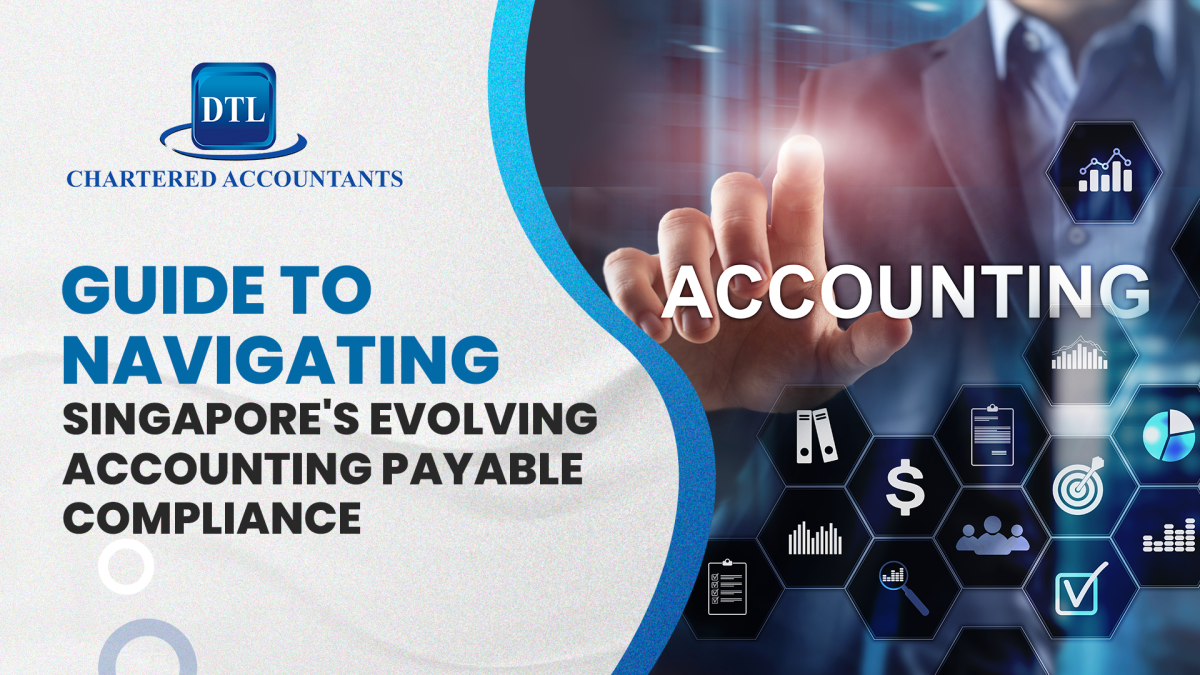Singapore has long been lauded for its pro-business environment, but this also means a dynamic regulatory landscape that businesses, particularly in Accounts Payable (AP), must meticulously navigate. Staying abreast of the latest Singapore-specific regulations and compliance requirements is not merely about avoiding penalties; it’s about fostering efficiency, building trust, and driving sustainable growth. For any accounting firm in Singapore worth its salt, understanding these nuances is critical to offering truly value-added accounting services in Singapore.
This article delves into the crucial regulatory shifts impacting Accounts Payable in Singapore, focusing on the game-changing InvoiceNow initiative and the pervasive importance of data protection. We’ll explore how these changes reshape daily operations and highlight why proactive compliance is the cornerstone of robust financial health.
The Paradigm Shift: InvoiceNow and E-Invoicing Mandates
The Inland Revenue Authority of Singapore (IRAS) and the Infocomm Media Development Authority (IMDA) are spearheading a national push towards e-invoicing through the InvoiceNow network. This initiative, based on the Peppol international standard, aims to streamline invoicing processes, reduce costs, and enhance data accuracy. For Accounts Payable departments, this represents a significant shift from traditional paper-based or PDF invoicing.
The adoption of InvoiceNow is not just encouraged; it’s progressively becoming mandatory for GST-registered businesses. This phased approach is designed to give businesses ample time to adapt their systems and processes.
Key Dates for GST InvoiceNow Requirement:
| Requirement | Effective Date | Description |
| Early Adoption (Voluntary) by existing GST-registered businesses | From 1 May 2025 | Existing GST-registered businesses can voluntarily start transmitting invoice data to IRAS using InvoiceNow-Ready Solutions via the InvoiceNow network. This serves as a “soft launch” period. |
| Mandatory for Newly Incorporated Companies (Voluntary GST) | From 1 November 2025 | Newly incorporated companies (incorporated within 6 months from the time they submit their application for GST registration) that voluntarily register for GST must use InvoiceNow for transmitting invoice data to IRAS. |
| Mandatory for All New Voluntary GST Registrants | From 1 April 2026 | All new voluntary GST registrants, regardless of their incorporation date or business constitution (e.g., companies, LLPs, sole proprietors, partnerships), must adopt InvoiceNow for transmitting invoice data to IRAS. |
| Future Mandate for Remaining GST-Registered Businesses | To Be Advised | IRAS will provide further details on the implementation timeline for existing GST-registered businesses (that did not opt for early adoption) and new compulsory GST registrants after further consultation. |
Source: IRAS
This phased rollout is strategic, allowing businesses, particularly SMEs, to gradually integrate e-invoicing into their operations. However, the onus is on businesses to prepare early. An accounting firm in Singapore can be an invaluable partner in this transition, helping companies assess their readiness, identify suitable InvoiceNow solutions, and ensure seamless integration with existing systems.
Beyond simply submitting invoices, businesses will need to ensure that their InvoiceNow solutions are connected to IRAS’s system via API technology and that the GST InvoiceNow submission feature is activated. This demands a keen understanding of both accounting principles and technological integration, areas where comprehensive accounting services in Singapore truly shine.
It’s also worth noting that under the GST InvoiceNow Requirement, businesses must transmit invoice data for specific transactions that are reported in the GST return. These typically include standard-rated supplies (excluding reverse-charge supplies), zero-rated supplies, exempt supplies, standard-rated purchases, and zero-rated purchases.
For point-of-sale supplies and petty cash purchases, businesses have the option to aggregate these transactions before transmission. The invoice data must be transmitted to IRAS by the earlier of the actual date the relevant GST return is filed or the official filing due date of that GST return.
Data Security and the Personal Data Protection Act (PDPA)
Beyond transactional efficiency, robust data security and compliance with the Personal Data Protection Act (PDPA) remain paramount for all businesses operating in Singapore. AP departments handle sensitive vendor and employee data, making them critical touchpoints for PDPA compliance. In a world where cyber threats are constantly evolving, safeguarding this information is not just a legal obligation but a fundamental business imperative.

Key Pillars of PDPA Compliance for Accounts Payable:
-
-
- Consent:
-
- Obtaining unambiguous consent from individuals (e.g., vendors, employees) before collecting, using, or disclosing their data. Exceptions apply for legitimate business purposes, but transparency is key.
-
- Consent:
-
- Purpose Limitation
-
- Personal data should only be collected, used, or disclosed for purposes that a reasonable person would consider appropriate. AP must ensure data collected for invoice processing isn’t misused for unrelated activities.
-
- Purpose Limitation
-
- Protection
-
- Implementing robust security measures to protect personal data from unauthorised access, collection, use, disclosure, copying, modification, or disposal. This includes encryption, access controls, and regular security audits. This is where an expert audit services Singapore provider can play a crucial role, assessing the adequacy of internal controls and data protection mechanisms.
-
- Protection
-
- Retention Limitation
-
- Personal data should not be retained longer than necessary to fulfil the purposes for which it was collected. Clear data retention policies are essential for AP records, typically requiring the retention of invoices and supporting documents for at least five years as per government regulations.
-
- Retention Limitation
- Data Breach Notification
-
- Organisations must assess and, if deemed notifiable, report data breaches to the Personal Data Protection Commission (PDPC) and affected individuals without undue delay. This requires a well-defined incident response plan.
-
-
The financial sector, in particular, is a prime target for cyberattacks. A 2024 report by Cybersecurity Ventures projected that global cybercrime costs would reach $10.5 trillion annually by 2025, highlighting the increasing sophistication of threats. While this is a global figure, Singapore, as a financial hub, is certainly not immune. AP teams, handling payment details and vendor bank information, are at the forefront of this risk. Therefore, continuous vigilance and adherence to PDPA are non-negotiable.
The Role of Accounting Professionals in Compliance
Given the complexity and continuous evolution of these regulations, businesses in Singapore often find it beneficial to partner with experienced accounting professionals. An established accounting firm in Singapore doesn’t just manage your books; they act as a vital compliance partner, offering expertise in:
-
-
- E-invoicing Implementation
-
- Guiding businesses through the InvoiceNow adoption process, from Peppol ID registration to integration with existing ERP systems. They can help businesses understand the nuances of the PINT SG format, which will become the exclusive e-invoice format from 2025.
-
- E-invoicing Implementation
-
- GST Compliance
-
- Ensuring accurate GST reporting and submission, particularly with the new InvoiceNow requirements for data transmission to IRAS. This includes verifying mandatory data elements and ensuring timely submissions.
-
- GST Compliance
-
- PDPA Audits and Advisory
-
- Conducting thorough reviews of data handling practices, identifying vulnerabilities, and advising on best practices to ensure compliance with privacy laws. This proactive approach from reputable audit services in Singapore can save businesses from significant penalties and reputational damage.
-
- PDPA Audits and Advisory
-
- System Integration
-
- Assisting with the implementation and optimisation of AP automation solutions that align with both regulatory requirements and business objectives, ensuring seamless data flow and compliance.
-
- System Integration
- Training and Education
-
- Educating internal AP teams on the latest regulations and best practices, empowering them to maintain compliance effectively.
-
-
For instance, studies show that companies that invest in proper compliance training can reduce their risk of non-compliance by up to 70%. When combined with professional accounting services in Singapore, this holistic approach creates a resilient and compliant financial operation. The integration of technology and regulatory adherence is rapidly becoming the norm, and a strong accounting partner can bridge this gap.
Embracing the Future of AP Compliance
The landscape of Accounts Payable in Singapore is undoubtedly transforming, driven by digital initiatives like InvoiceNow and the enduring importance of data protection. These changes, while challenging, present immense opportunities for businesses to enhance efficiency, mitigate risks, and strengthen their financial governance. Proactive engagement with these regulations is not just about ticking boxes; it’s about embedding a culture of compliance that supports sustainable business growth.
Navigating this complex terrain demands expertise and foresight. For businesses seeking comprehensive support in ensuring their Accounts Payable processes are robust, compliant, and future-ready, DTL Accounting Group stands ready to assist. With over two decades of experience, we offer a full spectrum of professional accounting, taxation, and advisory services tailored to the unique needs of Singaporean SMEs, helping them not just comply but thrive.
Ready to secure your compliance future and turn regulatory challenges into competitive advantages? Don’t leave your business exposed to potential pitfalls. Click here to connect with our experts today and gain a trusted partner in your journey towards seamless compliance and elevated financial management!

